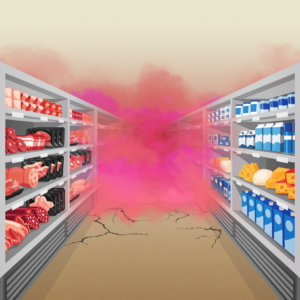Running Latte: Slow Progress on Methane in the Dairy and Coffee Industry

Dairy giants failing to cut methane emissions – audit
Widespread lack of targets, plans and transparency on potent climate gas
Danone alone has meaningful target. DMAA firms outperform peers marginally
Some of the world’s biggest makers and users of dairy products are failing to cut emissions of the climate-critical gas methane, a detailed analysis has found.
Methane is a major driver of rapid climate heating, being 80 times more powerful than carbon dioxide, though shorter lived. Cutting the gas is seen as a quick win to help keep global heating below 1.5°C. Livestock is the largest human-driven source of emissions, with around 8% down to dairy alone.
The non-profit Changing Markets Foundation scored 20 major dairy brands and large coffee house chains that are heavy users of dairy, based on their methane reduction goals, action plans, accounting and reporting.
The results are stark. Although all firms except Dunkin’, Starbucks and UK dairy company Froneri admit methane or livestock is a climate problem, only two firms (Nestlé and Danone) claim to have actually reduced methane emissions. Most lack clear methane-related targets, credible action plans or even basic transparency on emissions. None of the firms, which dominate European and North American markets and together rake in over $420 billion annually, are pledging to reduce dairy product sales. Nearly all (18 of 20 firms) scored less than half the available points. Only six (Arla, Danone, DMK, General Mills, Bel and Saputo) track their methane emissions directly, while only four disclose them.
Coffee chains are all in the bottom nine worst companies for methane inaction. Dunkin’ scored zero points for its complete lack of targets, plans and disclosures. Rough estimates suggest Starbucks US uses approximately 750 million litres of dairy milk annually, making dairy the largest single source of carbon emissions across its operations and supply chain.
Danone came top of the table, but with just 59 out of 100 points. It stands out as the only firm with a methane-specific target and a plan to hit it. Most companies have neither. General Mills came next with 53.5 points, having published a climate target and plans but not one specific to methane. Nestlé and Arla Foods tied for third on 49 points. Nestlé was the only firm to explicitly support reduced public consumption of dairy, though shied away from cuts to dairy product sales.
Changing Markets CEO, Nusa Urbancic, said: “Dairy production is a rare lever to control methane emissions, but one that firms clearly don’t want to touch. The near-total absence of methane-specific targets and credible action plans sends a clear signal: companies are turning a blind eye to emissions of one of the most potent and solvable drivers of global heating.”
Cutting methane could rapidly slow global heating, giving humanity more time to cut other greenhouse gases. At COP26 in Glasgow, 150 governments signed a Global Methane Pledge to slash emissions by 2030. Agriculture was a major focus, but relies on voluntary steps and incentives rather than enforceable targets. The pledge may miss its target unless the dairy sector gets serious about cutting methane, Changing Markets said.
At COP28 in Dubai, industry launched a Dairy Methane Action Alliance (DMAA). The Changing Markets audit found that the DMAA is making a marginal difference. Members scored a little higher than non-members in all main areas of the survey, especially European firms. But only three of the eight member companies have published targets to cut methane or wider dairy emissions. The DMAA focuses on transparency alone and, crucially, does not require members to set targets.
Industry lobbying has been a major barrier to progress. In both the US and EU, powerful meat and dairy interests have successfully blocked or weakened efforts to regulate agricultural methane. In the US, the Inflation Reduction Act directed $20 billion to cut methane in agriculture, but with weak enforcement rules. In the EU, farming interests have kept agricultural methane off the lawbooks. A 90% emissions reduction target for 2040 is already under attack with a carve out for farmers being considered by the unashamedly pro-business executive.
Industry favours technical fixes, such as feed additives and biogas, over binding regulation or systemic change. Big meat and dairy firms invest more in public relations than in actual climate solutions, Changing Markets has shown, resulting in ‘agricultural exceptionalism’, where the sector largely sets its own agenda and avoids the kinds of binding environmental obligations now common in energy and transport.
Nusa Urbancic added: “Our audit shows that fine words from business and a few voluntary actions are little more than hot air. Governments must finally grab the bull by the horns and set science-based methane cuts for the agricultural sector. All eyes are on European governments, given its leadership on the Global Methane Pledge and upcoming legislation in this area.”
Companies must cut methane by at least 30% by 2030, Changing Markets said, as well as track the gas properly, report milk volumes. A simple step up for coffee houses would be to ensure plant milk is the same price as dairy, it said. Consumers should favour more sustainable animal products and reduce their consumption, while pushing companies to improve.
Ends
Notes
The Changing Markets Foundation is a non-profit dedicated to exposing irresponsible corporate practices and driving sustainable market change. Their campaigns focus on holding companies accountable for environmental impacts and accelerating the transition to sustainable business models.
Running Latte: Slow Progress on Methane in the Dairy and Coffee Industry is available here: https://changingmarkets.org/report/running-latte/
You might also like...

The New Merchants of Doubt: How Big Meat and Dairy Avoid Climate Action
This report reveals the tactics of Big Meat and Dairy companies to delay, distract, and derail action on transforming the food system, mirroring strategies used by the tobacco and fossil fuel industries.

Dairytales: Arla’s smokescreen for its lack of climate action
As the world's fifth largest dairy producer, Arla has been selling a dairy fairytale of sustainability to continue to escape climate sanctions while prioritising false solutions that further industrialisatio...

“Clean Up on Aisle 3”: The methane mess supermarkets are hiding
New analysis finds twenty of the world's biggest food retailers fail to get to grips with massive methane emissions in their supply chains, despite meat and dairy making up an estimated one third of their to...